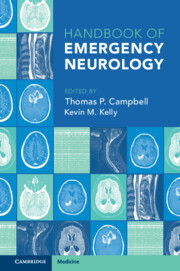Book contents
- Handbook of Emergency Neurology
- Handbook of Emergency Neurology
- Copyright page
- Contents
- Contributors
- Section 1 Neurologic Examination and Neurodiagnostic Testing
- Section 2 Common Neurologic Presentations: A Symptom-Based Approach
- Chapter 5 Coma, Delirium, and Dementia
- Chapter 6 Headache
- Chapter 7 Weakness
- Chapter 8 Musculoskeletal and Neurogenic Pain
- Chapter 9 Dizziness
- Chapter 10 Gait Disturbances
- Section 3 Specific Neurological Disorders in Emergency Medicine
- Index
- References
Chapter 7 - Weakness
from Section 2 - Common Neurologic Presentations: A Symptom-Based Approach
Published online by Cambridge University Press: 10 January 2024
- Handbook of Emergency Neurology
- Handbook of Emergency Neurology
- Copyright page
- Contents
- Contributors
- Section 1 Neurologic Examination and Neurodiagnostic Testing
- Section 2 Common Neurologic Presentations: A Symptom-Based Approach
- Chapter 5 Coma, Delirium, and Dementia
- Chapter 6 Headache
- Chapter 7 Weakness
- Chapter 8 Musculoskeletal and Neurogenic Pain
- Chapter 9 Dizziness
- Chapter 10 Gait Disturbances
- Section 3 Specific Neurological Disorders in Emergency Medicine
- Index
- References
Summary
Weakness is often a very complicated ED presenting complaint. A detailed history and physical examination, and diligent search for etiology, are required. First, the clinician must elucidate true weakness versus fatigue. Fatigue is best defined as a decrease in the ability to perform motor functions. Fatigue may be the complaint for a broad differential diagnosis, including acute coronary syndrome, anemia, chronic inflammatory diseases, dehydration, hypoglycemia or other electrolyte derangements, adrenal insufficiency, a variety of infections, pulmonary disorders, medication side effects, and depression. These disorders are characterized by a lack of true muscular weakness on examination. True muscular weakness is not painful, and pain should guide the examiner to other etiologies such as fibromyalgia or polymyalgia rheumatica.
- Type
- Chapter
- Information
- Handbook of Emergency Neurology , pp. 84 - 93Publisher: Cambridge University PressPrint publication year: 2023

